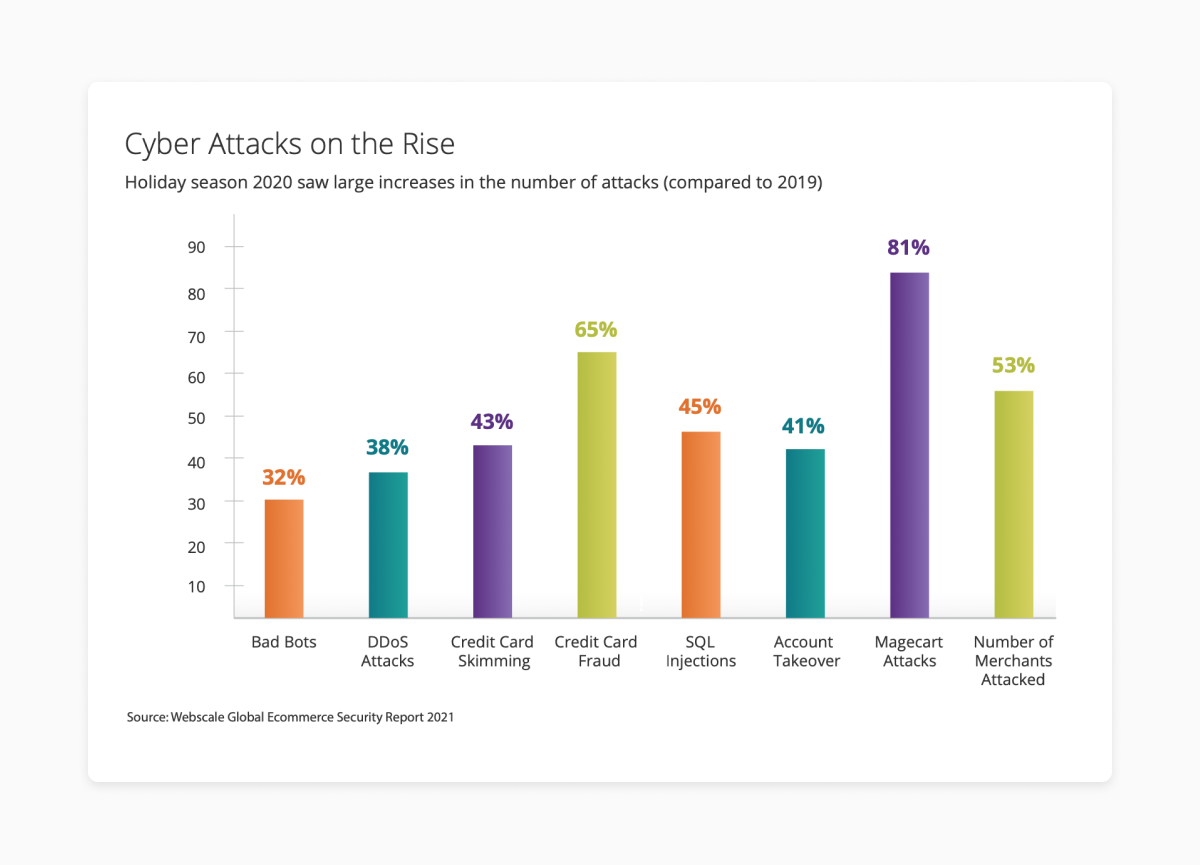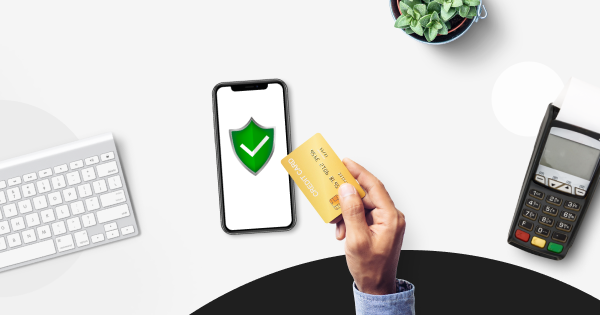Imagine losing your credit card information to a cyber attacker!
That is the feeling many Capital One customers had in July of 2019. Capital One has been at the forefront of digital transformation in the US banking industry. They made massive investments to strengthen checkout security.
However, in 2019, they revealed that the credit card database was compromised.
It shows why investing massive money in IT infrastructure is not everything. Especially for eCommerce businesses, secure checkouts for the website are essential.

Image credit: Webscale
The holiday season is vital for the eCommerce industry.
There is a massive spike in website visitors during Black Friday or Cyber Monday sales.
According to research, 2020 saw an enormous surge in cyberattacks during the holiday season compared to 2019.
It also suggested that Magento platforms were one of the primary targets for Magecart attacks. Therefore, major eCommerce businesses are committing to increased spending on security checkout.
So, here we are with practical ways to ensure your investment in the safe secure checkouts yield results.
But first, let us start with the fundamentals of checkout safety.
Table of Contents
What is a Secure Checkout?

Сheckout is a process for the payment of a specific product or service on eCommerce website. Securing the checkout process means allowing transactions without exposing financial data to hackers.
Discussing checkouts without cart abandonment rates seems incomplete. It is the rate at which a user leaves your website without completing the transaction. According to Shopify, eCommerce businesses lose $18 million in revenues due to cart abandonment.
One of the critical reasons users abandon your cart is a lack of trust. More than 17% of users leave a website because they do not trust it. Fortunately, there are some industry standards for an eCommerce website.
For example, every eCommerce website needs to follow PCI standards. It is a standard that defines how eCommerce businesses can store, secure and access users’ financial data. There are four levels of PCI standards,
- Merchants that process more than six million transactions per year
- Merchants that process total transactions to the amount between one million and six million
- Merchants processing transactions between a million and 20,000 annually
- Merchants with less than 20,000 transactions per year.
Ecommerce merchants need to secure checkouts in compliance with many different PCI requirements. We will discuss some of the best practices to follow for the security of the checkout process.
Best Standards for Checkout Security
#1. Encrypt, Encrypt, Encrypt
Recent years have seen advanced use cases for cryptographic encryptions.
For example, SSL/TLS certificates are helping eCommerce companies with encryption-based secure checkout for websites. SSL or secure sockets layer secures data transmission between two systems.
Users exchange financial information between the payment gateway and banks. It allows payments from user accounts during the checkout process. SSL secures the channel of this exchange, helping with checkout security.
After proper validation, certificate Authorities (CA) issue SSL/TLS certificates to merchants. It indicates trust for users that the channel of communication is secure for transactions.
How does SSL work?
SSL/TLS certificates function as identity proof for two systems engaging in data exchange. The two systems engage in a secure connection and generate security keys. The process of data exchange leverages security keys for encryption and decryption.
SSL/TLS certificates use two different types of encryptions for secure checkouts. First are symmetric encryptions that use the same security key for encryption and decryption. At the same time, the second type has a different key for the encryption and decryption process.
Encryption-based security can help you protect your user’s data during the checkout process. However, if you have more than one subdomain, issuance of individual SSL certificates can be a hassle. Fortunately, you can use a wildcard SSL certificate from a highly trusted CA.
For example, you can choose a RapidSSL wildcard or Comodo PositiveSSL wildcard certificate to secure multiple subdomains as they are available at a budget price. An eCommerce website can have many like [email protected], [email protected], and others. Wildcard SSL certificates are the best option to secure your primary and secondary domains.
Encryptions are your primary solution, but often it is an inherent problem in your development process that can cause issues.
#2. Inherent Issues
Ecommerce development has seen many innovations.
One of the key innovations is a ready-to-use platform that helps you deploy eCommerce apps quickly. These platforms provide advanced tools to develop eCommerce websites.
However, when it comes to safe secure checkouts, platforms can have some inherent vulnerabilities. For example, there are Magento security issues like cross-site scripting, remote code injection, etc.
So, how do we deal with inherent vulnerabilities?
One of the easiest ways to solve the problem with vulnerability inherent in the platform is to simplify the process. It allows your users to complete the transaction smoothly and checkout securely. A simplified checkout process also means better data security and a lower risk of exposure.
One way to use this is by choosing a one-page checkout process. It allows you to optimize the checkout process and add different information on the same page as an address, payment method, and more.
Such a page can allow users to keep data anonymous during the checkout process. Apart from these, you can use the following tips for Magento-based secure checkout,
- Extensive vulnerability scanning of the Magento website
- Execute penetration testing for enhanced security
- Conduct effective monitoring and logging of website activities
Using a one-page checkout process needs a high-end eCommerce website design. It is not just an excellent way to improve engagement but helps create a safe and secure checkout process.
#3. Secure Design
When you design the checkout process, there are many configurations and best practices to follow for security. It can impact your conversion rate due to security issues. A conversion rate measures the amount of website visitors converted into leads or sales. One of the most vital conversion mistakes most eCommerce companies make is poor usability.
Let us take a simple example of usernames in the checkout process. User authentication is a crucial process for secure checkouts. Without proper design configurations, hackers can use SQL injection for cyber-attacks.
So, if you are using the following code for username assigning process,
statement = “SELECT * FROM users WHERE name = ‘” + userName + “‘;”
Hackers can simply change the behavior of SQL statements,
SELECT * FROM users WHERE name = ‘a’;DROP TABLE users; SELECT * FROM userinfo WHERE ‘t’ = ‘t’;
Due to such SQL injection, attackers can access all the user’s credentials. So, your website design needs to be user-friendly and configured for checkout security.
#4. Dated Plugins
Creating a user-friendly design and improving functionality needs advanced tools. This is where platforms like Magento provide excellent plugins and features. However, a dated plugin without enough security patches can be susceptible to cyber-attacks. The outdated plugins are a security threat to eCommerce websites.
There is a customized plugin. Custom plugin development helps with specific security configurations that allow securing checkouts. You can design the website checkout page with critical functions such as,
- Multiple language support
- Different payment options
- Auto-pickup location detection
Signing Off
ECommerce companies are trying to improve the security of checkout pages. Yet, investing in safety does not always result in secure checkouts. It is essential to check checkout page configurations, code errors, plugins, etc.
Such analysis helps in designing an engaging checkout experience. So, start designing a secure and enhanced checkout experience!
Author’s bio:
Stefan Smith is a freelance content creator and SaaS link builder. He specially writes on eCommerce, SEO, Internet Marketing. Apart from this, he is good at cooking and reading.






